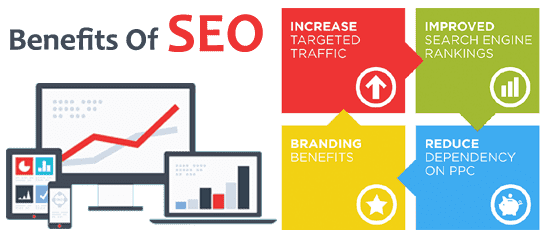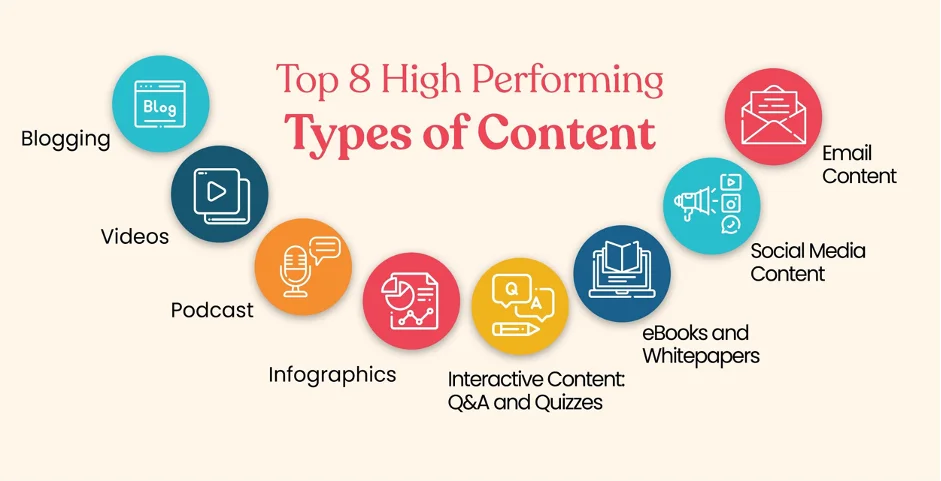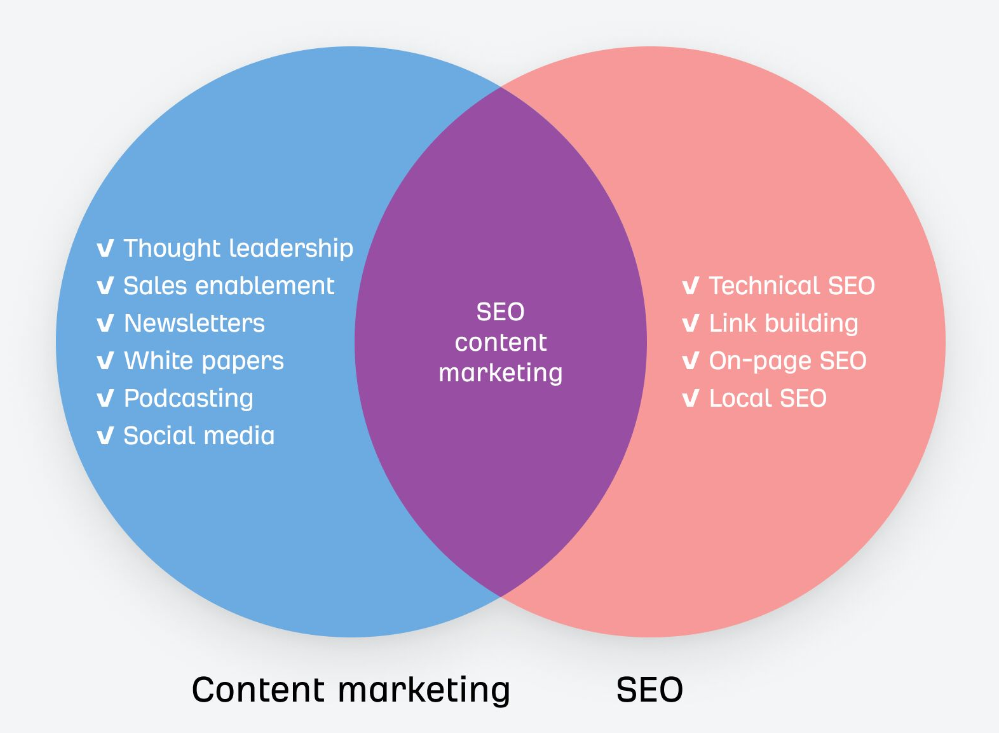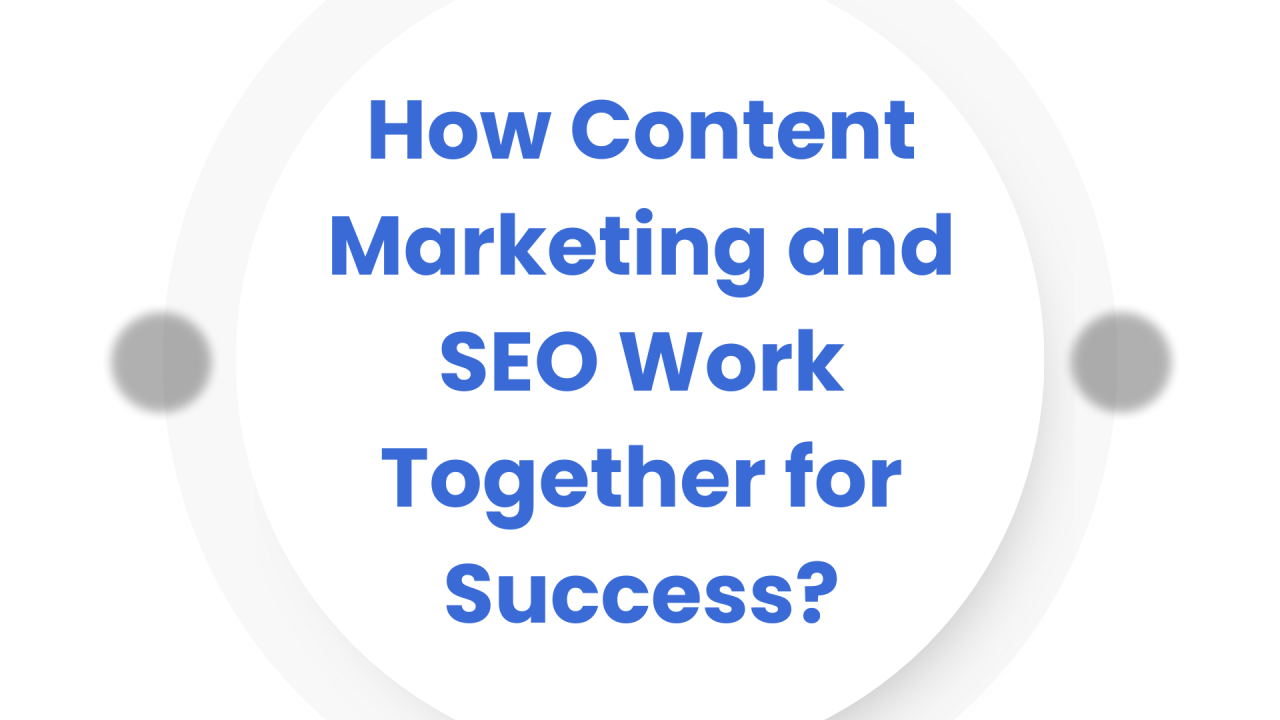In the digital marketing era, when discussing any strategies, usually two come across: SEO and content marketing. Quite a lot of businesses face the question of which strategy will produce results better SEO or content marketing. It is about how both approaches can deliver optimal success together. In this article, we will delve into how SEO and content marketing work together and why you cannot have one without the other if you are really determined to appear in a search and make those conversions.
What is SEO?
SEO stands for Search Engine Optimization. It refers to the complete process of optimization of a website to increase the visibility level of that website in results generated by a search engine. The resultant visibility in search engine’s result increases organic traffic, which further leads to more leads and conversions.
Main Parts Of SEO:
1. Keyword Research And Integration:
Track and integrate such special search terms, wherein the users seek, into the text of the website or heading/meta title /meta description wherever feasible, so that it is among the top results in search.
2. Page Speed Optimization:
A fast-loading website enhances the user experience, and visitors tend to stay on the site a little longer; this again impacts the SEO rankings.
3. Responsive design:
More than half of internet usage today comes from mobile. Google prefers mobile-friendly websites.
4. Link Building:
Quality backlinks from credible sources tell search engines that your site is of value and credibility
Benefits Of SEO:
SEO makes your website more visible to search engines like Google. Every time you optimize the site to a search engine, the chances are you will increase rankings in the searches, and viewers will be able to easily view the content. This increased visibility can lead to gaining more organic traffic since most people click on links that come up on the first page of a search.
With more visitors on your website, the possibilities of those visitors converting into customers or leads improve. Again, the chances of conversion in terms of sales or inquiries to the success of your business increase with SEO, as it targets the right audience.

What Is Content Marketing?
Content marketing is high-quality material that addresses issues relevant to your target audience and provides them with valuable information. By producing such content, you establish authority and trust with your audience by sharing your insight and expertise in your industry. It involves developing various contents such as blog posts, articles, social media posts, videos, and infographics.

Content Marketing Objectives:
The primary purpose of content marketing is to:
- Establish trust with your audience
- Become a thought leader in your industry
- Provide answers and insights to potential customers
- Engage the user
- Developing useful and relevant content may be used to drive traffic and foster leads, improving the presence of one’s brand.
Significance of SEO in Content Marketing:
SEO is a vital component for content marketing, because that’s how one increases visibility and credibility. While content marketing naturally aggregates authority through the dissemination of valuable information, SEO brings the intended message with search engine optimization for the right audience to view it. Digital PR amplifies credibility through the means of expression by the brand. Altogether, these factors create an integrated strategy for growth, as they establish authority, credibility, and visibility.
The great thing about optimizing your content for SEO is that you automatically create opportunities for keyword integration and link building. This synergy alone will improve search rankings, but it also expands your brand’s authority and trustworthiness. The combined effect of SEO and content marketing creates a much stronger, more cohesive marketing strategy that drives lasting results.
SEO vs. Content Marketing: How Are They Different?
While comparing SEO vs. content marketing strategies, one would identify some stark contrasts between the two strategies. Let’s look at two major differences between SEO and content marketing.
1. Technical vs. Creative:
SEO is more technical: That on-page and off-page optimizations apply to it. This includes ensuring the speed of the site and correcting any broken links to ensure that the website is mobile friendly. In contrast from above, content marketing is very creative and actually produces outstanding and engaging content for some specified audience.
2. Structure vs. Flexibility:
SEO is far more structured and adheres to best practices, such as keyword optimization or compliance with the technical standards of a search engine. Content marketing is fluid, leaving much to creative room. Set rules on how effective content should be written don’t exist, but one must always know their preference if he wants success in content.

How SEO And Content Marketing Work Together:
SEO and content marketing are two different approaches that are meant to be used together. Here is how these two approaches complement each other in a practical manner:
1. Start with Audience Research:
Understanding your target audience is majorly imperative for both SEO and content marketing. Do some intense research to learn the demographics, needs, and search habits of your target market. When you know your audience well, then:
- Develop content that resonates with them
- Use relevant keywords they are likely to look for
- Publish content on platforms they frequent
With this data integrated into your approach, you will ensure that you reach the right people, thereby ensuring that your SEO effort drives the right amount of traffic to that content.
2. Optimize content using SEO best practices:
Content forms the primary basis of SEO. But that alone is not enough for getting great content rankings; rather, it has to be optimized first. Here’s how you can do that:
-
Use the Right keywords:
Keyword research is finding those terms for which your target audience is looking, and these must be added integrally into your content. Finding secondary keywords may be possible with Google Keyword Planner and Ahrefs, where the keywords are found and are relevant with high search volume.
-
Optimizing your Titles and Meta Descriptions:
Titles and meta descriptions often are the first things users see when browsing through search results. Write interesting titles with your keywords embedded inside, and build interesting descriptions to enhance clickthrough rates.
-
Content Structure:
Headings, bullet points, and other visual items will make it more readable for your visitors but also help with SEO. A well-structured piece is better appreciated by search engines in terms of their ability to optimize user experience.
3. Quality informational content:
It is the core of any successful content marketing strategy. The more informative, engaging, and valuable your content is, the more users will spend time on your site and more likely that they will share your content and link to it-all of which help SEO.
Here why high-quality content is essential:
-
User Engagement
Engaging content will have users lingering longer on-site. This thus means that the search engines realize your content is actually valuable, and this will therefore improve your rankings.
-
Social Sharing
Should you have good and engaging content that speaks to your audience, it will be shared often through your social media platforms, thereby making your site more visible and bringing in more traffic.
-
Backlinks
Good content follows good backlinking coming from authoritative sources, thus boosting efforts for SEO.
Focus on creating a piece of long-form content that really satisfies the intent of covering that topic. Generally, long-form articles work better in searches since they provide more value and insight, thereby cutting the need for users to visit several sites.
4. Consistency is the Key:
SEO and content marketing are great efforts that are carried out consistently. SEO is actually a continuous monitored performance rather than a one-time optimization of activities through updates generated from content, which means that your site is technically accurate.
Content marketing is also a long-term plan. Periodic posting of original and informative content leads to establishing authority over time while keeping the audience up-to-date provides great content. You should create a content calendar in ensuring that you are consistently publishing and promoting the right content that aligns with your SEO goals.
5. Track and Analyze the Results:
To stay on top, you need to track and analyze your SEO and content marketing. Ensure you use Google Analytics and SEMrush tracking of key performance indicators including:
- Organic traffic
- Bounce rates
- Conversion rates
- Keyword rankings
Regular analysis allows one to optimize their strategy, identify areas of improvement, and derive data-driven decisions that enhance your SEO and content marketing performance.
How SEO and Content Marketing Drive Results Together:
Using both SEO and content marketing together enhances strengths, reduces weaknesses, and generates mutual results. Here are the ways through which they bring results as a single strategy:
Increased Visibility:
Through SEO, your content ranks higher in search results. This means a wider reach to prospects. The more optimized your content is for SEO, the more organic traffic it will attract.
User Experience:
SEO encompasses technical optimization, which would eventually allow better performance and experience of the site, but there is quality information with content marketing that keeps users interacting, thus making a seamless experience for visitors to the site where they are kept longer and converted.
Authority and Trust:
By publishing good quality SEO-friendly content continuously, you become the authority in the niche. Once your content ranks above other associated contents and brings other sites backlinks, a user will trust your brand as well as a search engine because of that.
Conclusion:
How does SEO and content marketing work together? The answer is simple: they form a powerful duo. Search engine optimization helps your content get found by search engines, while content marketing engages and retains the audience that you get onto your site. In the cycle of visibility and value, they are intertwined and able to bring high rankings, organic traffic, and user engagement. The simple fact is that they need to be paired together.
With proper SEO, content marketing is only successful. And SEO and content marketing are explosive together. Whether you are a start-up or an already established business, in the digital world, SEO and content marketing together help you achieve long-term success.
Read more interesting articles on DigitalAll Technologies.

